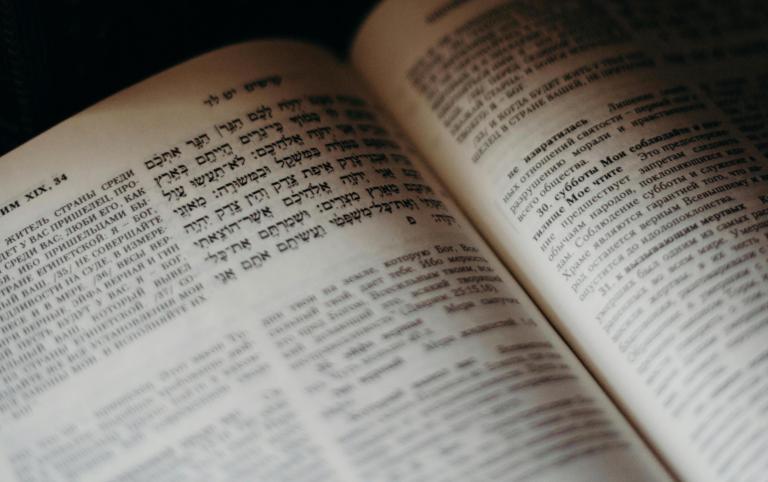If you’re using the name Jehovah, you’re doing it wrong. Here’s why.
One of the most famous texts in the Bible comes from Deuteronomy 6:4. In transliterated Hebrew the first phrase reads: “Sh’ma, Yisra’el! Adonai Eloheinu, Adonai echad.” You should try saying it out loud. It might be the most enjoyable thing I’ve ever learned to say in Hebrew. In English, it says something like: “Hear O Israel, the LORD is our God, the LORD alone [or, is one].” This text is from the Shema, part of the daily Jewish prayers, and is a great pathway into what I like to call: the terribly confusing, embarrassingly true story of the names of God.
The word Eloheinu comes from the Hebrew word Elohim, which is just a generic name for God or gods in the Hebrew Bible. There are many Elohim’s in the Old Testament, and the name isn’t exclusively used for Israel’s God, although Israel’s God was definitely referred to as an Elohim. Eloheinu is possessive, so it means: “our God.”
The word it’s paired with is Adonai, and together they mean “the LORD our God.” Adonai means Lord, but strangely, it’s not actually the word which originally held that place in the text. Originally that word was (transliterated into English), YHWH. It’s a word which comes to us from the book of Exodus, the scene at the burning bush where Moses asked, “Who should I even say has sent me?” This is where we get the famous, “I Am, that I Am,” passage. Transliterated into English that word is: Ehyeh, and it actually means, “I will be.” But if we go with the traditional “I am” reading, you can almost imagine Moses answering inquiries, “Who sent me? I’ll tell you who sent me: I am sent me!” It’s a total who’s on first routine.
So in the next passage, God says, “Just tell them YHWH sent me.” And from that moment on, YHWH was considered to be the personal name of Israel’s God. YHWH is the ancient form of the verb, “He will be,” and it appears more than 6,000 times in the Bible.
Over the years, the tradition grew among the Hebrew people that part of observing the command against taking the Lord’s name in vain meant they should refrain from speaking or even writing God’s proper name. So, anytime YHWH appeared in the text, they’d say Adonai (the LORD), or Hashem (the name) as a circumlocution (a great word in its own right). Jewish readers knew anytime they came to the word YHWH, they shouldn’t speak the name out loud. Instead, they should say “the LORD,” and thus avoid violating the command.
By the way: in many English Bibles the word YHWH doesn’t appear either. However, if translators spell the word LORD in all caps, this means in the original Hebrew the word was actually YHWH.
At some point, ancient Jewish scribes became concerned that people reading the text aloud could accidentally say the name YHWH. So, they came up with an interesting solution. They took the four consonants from the word YHWH, and the three vowels from the word Adonai, and sort of zippered them together to form the hybrid word: YAHOWAH — which wasn’t a real word at all. It’s just a mashup of YHWH and Adonai.
The idea was if someone got to reading the text to quickly and came upon the word YOHOWAH, they wouldn’t accidentally say the name of God and violate the command. They’d either remember to substitute Adonai, or, if they forgot, they’d say this made-up hybrid word YOHOWAH. No harm, no foul. The only purpose this made-up word had was as a placeholder, reminding the reader that the original word in that text was YHWH. But, out of reverence for God, we don’t say YHWH, we say Adonai instead. However, if you forget? No problem. You’ll just be saying this nonsense word — YOHOWAH — and will be in no danger of violating the commandment. Jewish readers were not confused by this made-up word. And nobody ever actually said YOHOWAH on purpose. It wasn’t a real word.
Here’s where it gets funny (or embarrassing), depending on how you see it. Later on, Christian readers, commentators, and translators encountered this word YOHOWAH in the text, but they had a huge problem: they didn’t know its history. They didn’t know the story behind this made up word and how it was supposed to function. They thought YOHOWAH was actually one of the names for Israel’s God. So, like a child mispronouncing mazagine or pasgetti, they began to say YOHOWAH aloud, and write it as if it were one of God’s names. Eventually, this word morphed into a word you probably recognize: Jehovah.
Gulp. It pays to know your history.
So, next time you hear a fundamentalist preacher talking about wrath of “Jehovah Gawd,” you can chuckle to yourself, because you know they have no idea what they’re saying, or y’know … not saying. Or you can pull a Ron Swanson and flatly state: “I know more than you.”
Either way, if you’re still using the name Jehovah, you’re doing it wrong.
Follow Tim on (what used to be) Twitter: @Tim_Suttle

















